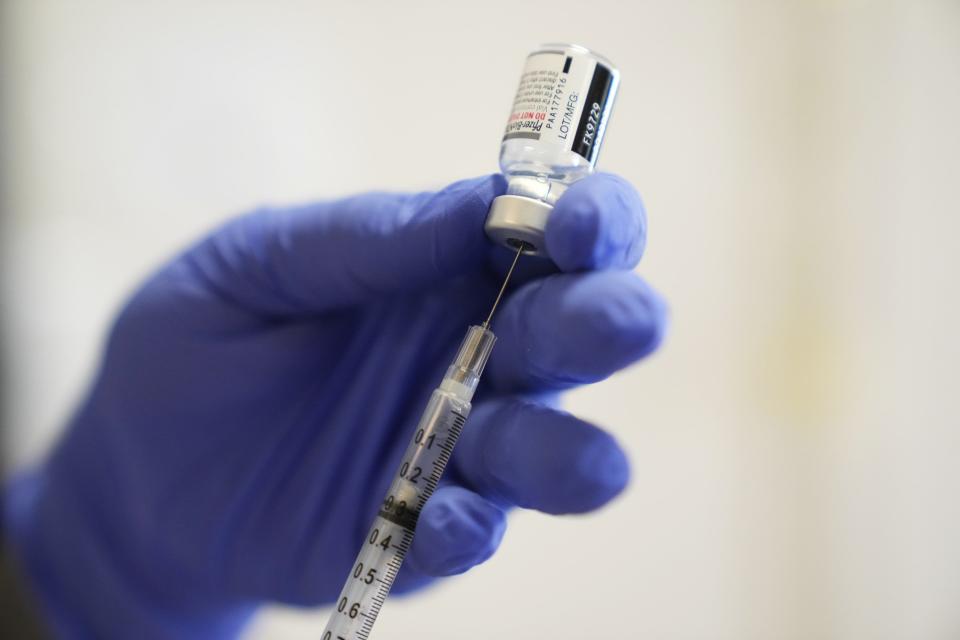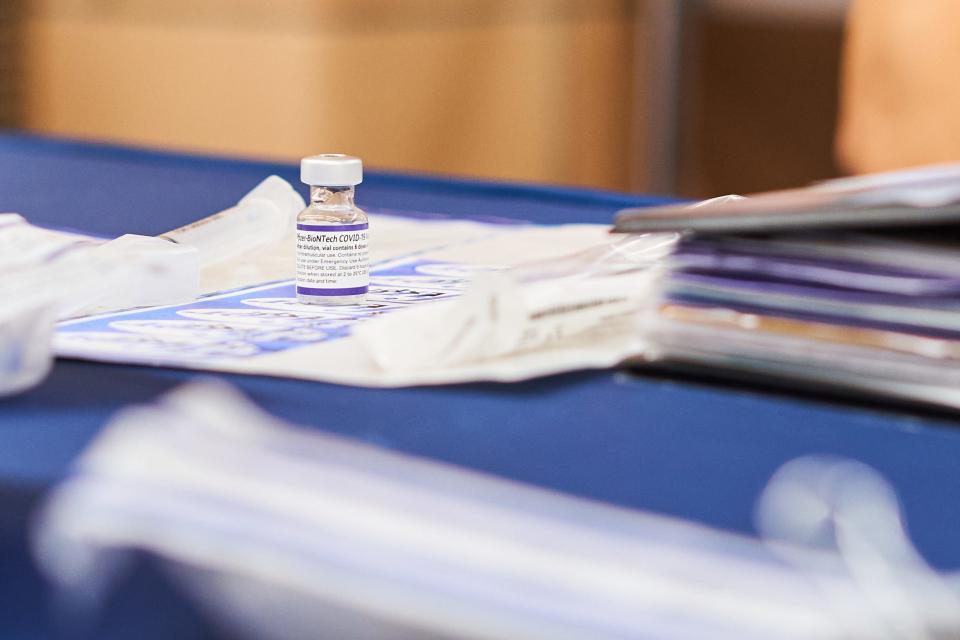5 things Arizonans should know about new COVID vaccines (and they're not called boosters)
A new COVID-19 vaccine, recommended for everyone ages 6 months and older, will be available in Arizona as early as this week.
The U.S. Centers for Disease Control and Prevention issued its recommendation Tuesday and the new single-shot COVID-19 vaccines from Pfizer-BioNTech and Moderna are expected to be widely available starting Monday.
"If you have not received a COVID-19 vaccine in the past two months, get an updated COVID-19 vaccine to protect yourself this fall and winter," CDC officials said in a statement.
Hospitalizations and deaths from COVID-19 are on the rise nationwide, including in some parts of Arizona, data from the U.S. Centers for Disease Control and Prevention says. Mohave County reported a nearly 60% increase in COVID-19 hospitalizations for the week ending Sept. 9, which was the highest increase in the state, the CDC data shows. Six other Arizona counties had increases of 10% or more, according to the CDC: Maricopa, Yavapai, Navajo, Coconino, Pinal, and Gila.
Eighteen Arizona deaths from COVID-19 were reported for the week ending Sept. 9, up from two deaths reported the previous week, the Arizona Department of Health Services dashboard says. Reported cases are up statewide, too.
Here are five things Arizonans need to know about the new COVID-19 vaccine.
The vaccine is recommended for ages 6 months and older

The CDC recommends everyone age 6 months and older get an updated COVID-19 vaccine for the 2023-24 season to protect against serious illness.
The main reason to get vaccinated is to protect yourself against severe illness, hospitalization and death, CDC officials say. COVID-19 vaccines also reduce the chance of having Long COVID. The federal agency says the new vaccines are expected to provide better protection against variants that are currently making people sick.
The updated vaccine is similar to earlier mRNA COVID-19 vaccines that were administered safely to hundreds of millions of Americans during the pandemic, the CDC says.
The U.S. Food and Drug Administration, the CDC, and evidence-based research shows the benefits of COVID-19 vaccination continue to outweigh any potential risks. Serious reactions after COVID-19 vaccination are rare, the CDC says.
Federal officials referred to last year's vaccine as a "booster," but this season they have been calling the new shot a vaccine.
While evidence indicates people who received the updated bivalent COVID-19 booster last season had more protection against illness and death than people who did not receive it, most Arizonans and most Americans did not get it. Just 17% of all Americans and 15.8% of Arizonans received the updated booster last season.
COVID-19 is not causing the volume of deaths and illness that it once did
The CDC says the COVID-19 burden is lower right now than at previous points in the pandemic.
"However, the absolute number of hospitalizations and deaths remains high," the CDC website says. "Older adults and persons with weakened immune systems are at highest (risk) for severe illness. Additionally, children and adults with no underlying medical conditions can still experience severe illness due to COVID-19."
National pharmacy chains are expected to have new COVID-19 vaccine as early as this week
Illinois-based Walgreens says individuals may schedule appointments for the new COVID-19 vaccine immediately, with availability starting Monday. Earlier appointments may be added on a rolling basis as stores receive vaccines this week, officials said in a news release.

Rhode Island-based CVS said its pharmacies were to begin receiving the new vaccine on Wednesday and would continue to receive inventory on a rolling basis throughout the week. All CVS Pharmacy locations are expected to have the vaccination in stock by early next week, according to a company news release.
The new COVID-19 vaccine is expected to be free for most people
This fall and winter marks the first season that the COVID-19 vaccine will be commercialized, meaning it's not universally covered by the federal government. But the vaccine should be free through most insurance plans and government insurance.
Under the Affordable Care Act, all insurance companies are required to cover vaccines that are recommended by the Advisory Committee on Immunization Practices, including the updated COVID-19 vaccines.
All children without insurance can get their COVID-19 vaccine under the Vaccines for Children Program.
The CDC's Bridge Access Program will provide free COVID-19 vaccines to uninsured and underinsured adults. Both CVS and Walgreens are participating in the program.
Uninsured or underinsured adults may go to vaccines.gov to find COVID-19 vaccines at no cost to them.
Officials with the Maricopa County Department of Public Health said Wednesday that they are waiting to find out when the new vaccine will be available.
"We plan on offering it through our clinics and vaccine events then. We’re working on putting together a page on our website that will help people find vaccines for COVID-19 and flu, whether through us or not," department spokesperson Sonia Singh wrote in an email.
"These vaccines will help reduce severity of illness if people are exposed and become ill, and with this being respiratory illness season, taking steps like getting vaccinated, washing hands, and staying home when sick can help everybody have a healthier season with less strain on the health care system."
The Arizona Department of Health Services did not immediately respond to a request for information about the COVID-19 vaccine on Wednesday.
Officials say some will need 3 shots against fall and winter respiratory viruses
RSV, or respiratory syncytial virus, is a serious problem in both the very old and very young. It is the leading cause of hospitalization among infants in the country, according to the CDC. An RSV vaccine recommended for adults ages 60 and older, based on shared decision-making with their provider, is already available.
It's safe for those getting the RSV shot to get the flu and COVID-19 shot all at once.
"It is absolutely OK to get all three vaccines at one time," said Nicole Henry, a pharmacist and district leader for CVS Health in Phoenix, which is already administering RSV shots to older adults. "It's also patient preference. If patients want to spread them out, they can, there's no harm in that. Or they can get them all at one time."
Henry said the fall and winter months are no longer "flu season" but rather "respiratory illness season."
RSV prevention tools for pregnant people and for babies are expected soon. Both have received FDA approval.
Reach health care reporter Stephanie Innes at Stephanie.Innes@gannett.com or at 602-444-8369. Follow her on X formerly known as Twitter @stephanieinnes.
This article originally appeared on Arizona Republic: New COVID vaccine is here in Arizona (and it's not called a booster)

